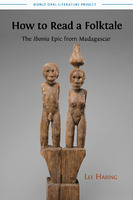How to Read a Folktale
The 'Ibonia' Epic from Madagascar
| dc.contributor.author | Haring, Lee | |
| dc.contributor.author | Turin, Mark | |
| dc.date.accessioned | 2018-04-03 00:00:00 | |
| dc.date.accessioned | 2020-04-01T12:51:05Z | |
| dc.date.available | 2020-04-01T12:51:05Z | |
| dc.date.issued | 2013 | |
| dc.identifier | 646721 | |
| dc.identifier | OCN: 878145045 | en_US |
| dc.identifier.issn | 2050-7933/2050-7933;2050-7933/2054-362X | |
| dc.identifier.uri | http://library.oapen.org/handle/20.500.12657/30303 | |
| dc.description.abstract | How to Read a Folktale offers the first English translation of Ibonia, a spellbinding tale of old Madagascar. Ibonia is a folktale on epic scale. Much of its plot sounds familiar: a powerful royal hero attempts to rescue his betrothed from an evil adversary and, after a series of tests and duels, he and his lover are joyfully united with a marriage that affirms the royal lineage. These fairytale elements link Ibonia with European folktales, but the tale is still very much a product of Madagascar. It contains African-style praise poetry for the hero; it presents Indonesian-style riddles and poems; and it inflates the form of folktale into epic proportions. Recorded when the Malagasy people were experiencing European contact for the first time, Ibonia proclaims the power of the ancestors against the foreigner. Through Ibonia, Lee Haring expertly helps readers to understand the very nature of folktales. His definitive translation, originally published in 1994, has now been fully revised to emphasize its poetic qualities, while his new introduction and detailed notes give insight into the fascinating imagination and symbols of the Malagasy. Haring’s research connects this exotic narrative with fundamental questions not only of anthropology but also of literary criticism. | |
| dc.language | English | |
| dc.relation.ispartofseries | World Oral Literature Series | |
| dc.subject.classification | thema EDItEUR::D Biography, Literature and Literary studies::D Biography, Literature and Literary studies::DC Poetry | en_US |
| dc.subject.classification | thema EDItEUR::J Society and Social Sciences::JB Society and culture: general::JBG Popular beliefs and controversial knowledge::JBGB Folklore studies / Study of myth (mythology) | en_US |
| dc.subject.classification | thema EDItEUR::J Society and Social Sciences::JH Sociology and anthropology::JHM Anthropology::JHMC Social and cultural anthropology | en_US |
| dc.subject.other | ibonia | |
| dc.subject.other | madagascar | |
| dc.subject.other | literary criticism | |
| dc.subject.other | folktale | |
| dc.subject.other | folklore | |
| dc.subject.other | malagasy people | |
| dc.subject.other | world oral literature project | |
| dc.subject.other | anthropology | |
| dc.subject.other | Merina people | |
| dc.subject.other | Old Man (song) | |
| dc.title | How to Read a Folktale | |
| dc.title.alternative | The 'Ibonia' Epic from Madagascar | |
| dc.type | book | |
| oapen.identifier.doi | 10.11647/OBP.0034 | |
| oapen.relation.isPublishedBy | 23117811-c361-47b4-8b76-2c9b160c9a8b | |
| oapen.collection | ScholarLed | |
| oapen.pages | 163 | |
| oapen.remark.public | Relevant Wikipedia pages: Folklore - https://en.wikipedia.org/wiki/Folklore; Ibonia - https://en.wikipedia.org/wiki/Ibonia; Madagascar - https://en.wikipedia.org/wiki/Madagascar; Merina people - https://en.wikipedia.org/wiki/Merina_people; Old Man (song) - https://en.wikipedia.org/wiki/Old_Man_(song) |

